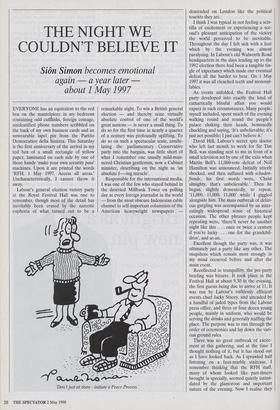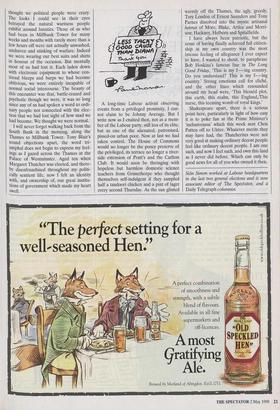THE NIGHT WE COULDN'T BELIEVE IT
Sion Simon becomes emotional
again — a year later - about 1 May 1997
EVERYONE has an equivalent to the red box on the mantelpiece in my bedroom containing odd cufflinks, foreign coinage, unidentified phone numbers scribbled on the back of my own business cards and an unwearable lapel pin from the Partito Democratico della Sinistra. This Saturday is the first anniversary of the arrival in my red box of a small rectangle of yellow paper, laminated on each side by one of those handy 'make your own security pass' machines. Upon it are printed the words `RFH. 1 May 1997. Access all areas.' Uncharacteristically, I cannot throw it away.
Labour's general election victory party at the Royal Festival Hall was one to remember, though most of the detail has inevitably been erased by the narcotic euphoria of what turned out to be a remarkable night. To win a British general election — and thereby seize virtually absolute control of one of the world's great nations — is never a small thing. To do so for the first time in nearly a quarter of a century was profoundly uplifting. To do so on such a spectacular scale, annihi- lating the parliamentary Conservative party into the bargain, was little short of what I remember one usually mild-man- nered Christian gentleman, now a Cabinet minister, describing on the night as 'an absolute f—ing miracle'.
Responsible for the international media, I was one of the few who stayed behind in the deserted Millbank Tower on polling day as every foreign journalist in the world — from the most obscure Indonesian cable channel to self-important columnists of the American heavyweight newspapers — `Don't just sit there - initiate a Peace Process.' descended on London like the political tourists they are.
I think I was typical in not feeling a scin- tilla of excitement or experiencing a sec- ond's pleasant anticipation of the victbry the world perceived to be inevitable. Throughout the day I felt sick with a fear which by the evening was almost paralysing. In Labour's old Walworth Road headquarters in the days leading up to the 1992 election there had been a tangible tin- gle of expectancy which made our eventual defeat all the harder to bear. On 1 May 1997 it was all clenched teeth and monosyl- lables.
As events unfolded, the Festival Hall party developed into exactly the kind of cathartically blissful affair you would expect in such circumstances. Many people, myself included, spent much of the evening walking round and round the people's palace shaking their heads, bemusedly chuckling and saying, 'It's unbelievable; it's just not possible; I just can't believe it.'
David Hill, Labour's secret spin doctor who left last month to work for Sir Tim Bell, was standing next to me in front of a small television set by one of the exits when Martin Bell's 11,000-vote defeat of Neil Hamilton was announced. Initially utterly shocked, and then suffused with schaden- freude, his first words were, 'Christ almighty, that's unbelievable.' Then he began, slightly dementedly, to repeat, `11,000, 11,000, 11,000' while I giggled alongside him. The mass outbreak of deliri- ous gurgling was accompanied by an inter- estingly widespread sense of historical occasion. The other phrases people kept repeating were, 'there'll never be another night like this . . . once or twice a century if you're lucky . . . one for the grandchil- dren', and so on.
Excellent though the party was, it was ultimately just a party like any other. The snapshots which remain most strongly in my mind occurred before and after the main event.
Recollected in tranquillity, the pre-party briefing was bizarre. It took place in the Festival Hall at about 9.30 in the evening, the first guests being due to arrive at 11. It was run by Labour's ruthlessly efficient events chief Jacky Stacey, and attended by a handful of jaded types from the Labour press office, and three or four dozen young people, mainly in uniform, who would be serving the drinks and generally staffing the place. The purpose was to run through the order of ceremonies and lay down the vari- ous ground rules.
There was no great outbreak of excite- ment at this gathering, and at the time I thought nothing of it, but it has stood out as I have looked back. As I sprawled half listening on a faux-marble staircase, I remember thinking that the RFH staff, many of whom looked like part-timers brought in specially, seemed quietly intimi- dated by the glamorous and important nature of the evening. Now I realise they thought we political people were crazy. The looks I could see in their eyes betrayed the natural wariness people exhibit around lunatics. Those of us who had been in Millbank Tower for many weeks and months with rarely more than a few hours off were not actually unwashed, unshaven and stinking of warfare. Indeed we were wearing our best suits and shirts m honour of the occasion. But mentally most of us had lost it. Each laden down with electronic equipment to whose con- tinual bleeps and burps we had become oblivious, we were entirely incapable of normal social intercourse. The beauty of this encounter was that, battle-crazed and psychotic though we were, it was so long since any of us had spoken a word to ordi- nary people not connected with the elec- tion that we had lost sight of how mad we had become. We thought we were normal.
I will never forget walking back from the South Bank in the morning, along the Thames to Millbank Tower. Tony Blair's sound objections apart, the word tri- umphal does not begin to express my feel- ings as I gazed across the Thames at the Palace of Westminster. Aged ten when Margaret Thatcher was elected, and there- by disenfranchised throughout my politi- cally sentient life, now I felt an identity with, and ownership of, our great institu- tions of government which made my heart swell. A long-time Labour activist observing events from a privileged proximity, I can- not claim to be Johnny Average. But 1 write now as I exulted then, not as a mem- ber of the Labour party, still less of its elite, but as one of the alienated, patronised, pissed-on urban poor. Now at last we had taken control. The House of Commons would no longer be the poncy preserve of the privileged, its terrace no longer a river- side extension of Pratt's and the Carlton Club. It would soon be thronging with hopeless but harmless domestic science teachers from Grimethorpe who thought themselves self-indulgent if they sampled half a tandoori chicken and a pint of lager every second Thursday. As the sun glinted warmly off the Thames, the ugly, greedy, Tory London of Ernest Saunders and Tony Parnes dissolved into the mystic artisanal heimat of More, Blake, Attlee and Morri- son; Hackney, Holborn and Spitalfields.
I have always been patriotic, but the sense of having finally achieved full citizen- ship in my own country was the most intense feeling of allegiance I ever expect to have. I wanted to shout, to paraphrase Bob Hoskins's famous line in The Long Good Friday, 'This is my f—ing country. Do you understand? This is my f—ing country.' Strong emotions call for cliché, and the other lines which resounded around my head were, 'This blessed plot, this earth, this realm, this England/This nurse, this teeming womb of royal kings.'
Shakespeare apart, there is a serious point here, particularly in light of how easy it is to poke fun at the Prime Minister's `inclusiveness' which this week sent Chris Patten off to Ulster. Whatever merits they may have had, the Thatcherites were not very good at making ordinary decent people feel like ordinary decent people. I am one such, and now I feel such, and own this land as I never did before. Which can only be good news for all of you who owned it then.
Sion Simon worked at Labour headquarters in the last two general elections and is now associate editor of The Spectator, and a Daily Telegraph columnist.



























































 Previous page
Previous page